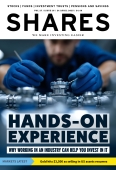Archived article
Please note that tax, investment, pension and ISA rules can change and the information and any views contained in this article may now be inaccurate.
Markets on fast forward as gold continues to shine

Is it really less than 100 days since the Trump administration took office? The symbolically significant 100th day actually comes next week on 30 April but such has been the speed at which it has moved that it feels like the whole world has been on fast forward ever since. Nowhere has this been more evident than in precious metal prices.
Having topped $2,000 for the first time in August 2020 during pandemic uncertainty, it took another four years for gold to hit the $2,500 mark. Then, by March of this year, so a little more than six months later, it crossed over the $3,000 threshold. Astonishingly it has taken less than six weeks to hit $3,500, with $4,000 an ounce – a level we discussed in last week’s issue – now very much in sight.
Sabuhi Gard takes you through the latest market drama and why US assets remain under considerable pressure in this week’s News section
At times like this it pays to stay grounded and our main feature this week from James Crux looks at fund managers with hands-on experience in the industry or sector they are investing in and how this can give them an edge. We also highlight investment trusts offering the potential for steady income during unsettling times.
Elsewhere in the digital magazine, you can read more about two companies which appear to be thriving despite all the uncertainty – electronics retailer Currys (CURY) and streaming services giant Netflix (NFLX:NASDAQ).
Boring can be beautiful on the stock market. Sound companies, whose activities are less than glamorous yet generate sustainable cash flows and profitable growth, often attract fans.
However, if a previous steady Eddie messes up the results can be pretty ugly. So it proved with Bunzl (BNZL). The company distributes everyday essentials like disposable coffee cups and food wrap which enable businesses to carry out their day-to-day activities.
The market has come to prize the company’s reliability, so the major profit warning on 16 April and decision to suspend the share buyback (of which you can read more detail in this week’s News section) led to a pronounced sell-off.
It could take months or years to undo the damage done to the company’s reputation by a single announcement as investors look for it to reclaim its credentials as a mundane marvel. It also suggests that investors may have started to take buybacks for granted. This method of returning capital to shareholders has been perceived as more flexible than a dividend, where a cut or suspension would cause more disquiet. Bunzl’s experience suggests that may no longer hold true.
Important information:
These articles are provided by Shares magazine which is published by AJ Bell Media, a part of AJ Bell. Shares is not written by AJ Bell.
Shares is provided for your general information and use and is not a personal recommendation to invest. It is not intended to be relied upon by you in making or not making any investment decisions. The investments referred to in these articles will not be suitable for all investors. If in doubt please seek appropriate independent financial advice.
Investors acting on the information in these articles do so at their own risk and AJ Bell Media and its staff do not accept liability for losses suffered by investors as a result of their investment decisions.
 magazine
magazine








